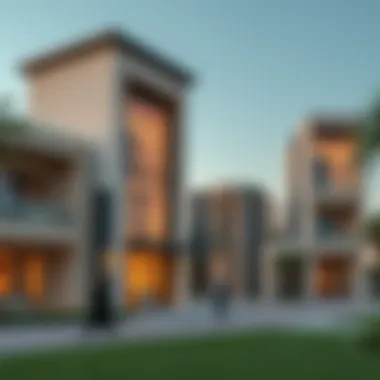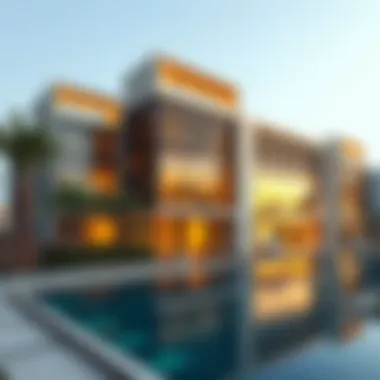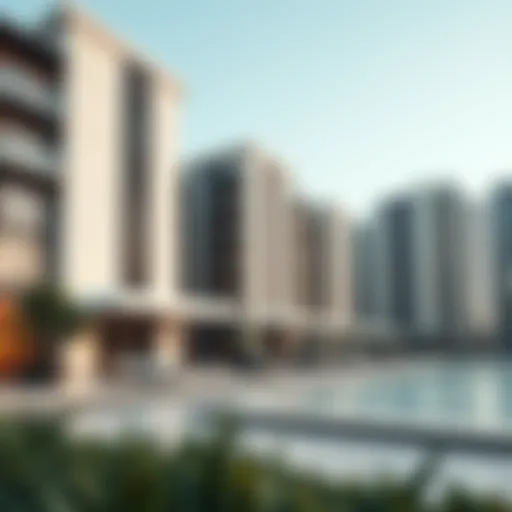Understanding Living Costs in the UAE: A Comprehensive Guide


Intro
Living in the United Arab Emirates can feel like stepping into a modern-day oasis. The glimmering skyscrapers and sprawling malls paint a picture of luxury. However, behind this glamorous facade lies an intricate web of living costs that potential residents must navigate. This article aims to provide a clear perspective on the various expenses that individuals and families face when settling in this dynamic region. From the cost of housing, which can fluctuate wildly between emirates, to transportation and utility costs, it’s crucial to grasp these financial aspects to make informed decisions.
Whether you're an investor eyeing opportunities, a buyer ready to make a move, a seller wanting to know the market, or even an agent guiding clients, understanding these elements can mean the difference between a smooth transition and costly surprises. Delving into the nuts and bolts of living expenses will arm you with the knowledge needed to thrive in the UAE.
Property Market Overview
The property market in the UAE operates in a distinctive rhythm, influenced by both domestic and international factors. Understanding current trends and notable neighborhoods can provide insight into the shifting landscape.
Current Market Trends
The real estate scene here fluctuates like the tides. Recently, there has been a noted increase in demand for rental properties, thanks, in part, to an influx of expatriates seeking opportunities in the vibrant job market. Off-plan properties are gaining traction, too, with many developers promoting flexible payment options to attract buyers.
Some key trends to note include:
- Luxury living: High-end apartments and villas continue to thrive, especially in areas like Dubai Marina and Abu Dhabi's Al Reem Island.
- Sustainable developments: With a growing emphasis on environmental consciousness, sustainable building practices are being favored by both buyers and renters.
- Rise of remote work: More people seeking larger living spaces as hybrid work models gain ground.
These trends don't just shape the market but also signify broader economic shifts within the country. Keeping an eye on these changes can help you gauge where to invest your resources effectively.
Key Neighborhood Insights
Each emirate flaunts its unique characteristics, making some neighborhoods particularly appealing while others may not fit certain lifestyles.
- Dubai Marina: Known for its nightlife and growing community, it’s ideal for younger crowds or expats. However, rental prices can be steep.
- Palm Jumeirah: A go-to for affluent buyers seeking beachfront luxury, this area draws those with a preference for high-end living but at a hefty price.
- Abu Dhabi's Al Ain: If serenity is your aim, this area offers a slower pace and affordable housing options accompanied by stunning landscapes.
An Overview of Living Costs in the UAE
Understanding the cost of living in the UAE is crucial for anyone looking to move or invest in this dynamic landscape. It’s not just about numbers; it involves comprehending how these figures influence day-to-day life and financial planning. The UAE, known for its dazzling skyline and diverse expat community, offers a mixed bag of opportunities and challenges regarding living expenses.
When assessing the cost of living, it’s important to consider various facets such as housing, utilities, transportation, and daily essentials. Expats often discover that costs can swing significantly from one emirate to another. For instance, life in Dubai generally comes with a heavier price tag compared to places like Sharjah or Ajman, but these differences can also present unique opportunities in terms of affordability and lifestyle.
"The cost of living isn’t just a number; it reflects the quality of life and your financial health in a new country."
In this section, we aim to provide an insight into the foundational aspects of living costs, laying out the important elements including what drives these expenses and how one can adequately prepare for them. Tackling this subject allows potential residents and investors to align their expectations and strategies with the financial realities of living in the UAE.
Preamble to the Cost of Living
The cost of living encapsulates the total expenses an individual or family incurs while residing in a specific location. This includes housing, transportation, food, healthcare, and educational costs. In the UAE, these costs can often be a bit of a mixed bag, shaped by local and international economic conditions, supply and demand for housing, and lifestyle choices.
Historically, one can glean that the cost of living in the UAE has undergone substantial changes. The recent trends show a fluctuation in prices, often correlating with the economic situation and changes in government policy. These costs are vital to comprehend as they can have a significant impact on an individual�’s financial stability and lifestyle choices.
Factors Influencing Living Costs
Inflation Rates
Inflation plays a pivotal role in determining the living costs in the UAE. When inflation rises, purchasing power diminishes, making daily life expenses more burdensome for residents. One key characteristic of inflation in the UAE is its relatively moderate pace compared to other countries in the region. This could be seen as a benefit, offering some stability.
For instance, sectors like housing and groceries often see quicker spikes as inflation affects supply chains and service costs. Knowing how inflation rates impact your budget can aid in better financial planning, allowing residents to adjust consumption habits accordingly.
Economic Conditions
The economic environment fundamentally shapes living costs. The UAE thrives on a diverse economy that has a strong reliance on oil as well as a vibrant tourism and service sector. A dip or uptick in the economy can lead to alterations in living expenses.
The key here is to keep your ear to the ground regarding economic forecasts and shifts. Being aware of economic fluctuations can give potential movers a heads-up on expected living costs, assisting them to make informed decisions. Understanding the economic landscape prepares residents to manage their finances properly in this ever-evolving environment.
Government Policies
Government policies in the UAE have a substantial impact on living costs. Regulations and laws surrounding areas such as foreign ownership of property, tax structures, and residency permits inform housing and other daily expenses. A notable characteristic of such policies is how they may change swiftly, often in response to economic indicators. For example, recent initiatives aimed at making life more affordable for expats have adjusted pricing structures in various sectors.
These policies can provide advantages, such as subsidies or incentives for new residents. Conversely, any abrupt changes might lead to uncertainty in budgeting and lifestyle expenses. Understanding these policies contributes to making prudent financial decisions as residents navigate this vibrant yet challenging market.
Housing Expenses
Housing expenses are a vital piece of the puzzle when it comes to living in the UAE. With the rapid growth and changes in its housing market, understanding where to live and the associated costs can significantly impact one’s quality of life. This section focuses on the nuances of housing expenses, including rent, property buying options, and additional costs that often catch newcomers off guard.
Rental Market Overview
The rental market in the UAE is dynamic, shifting according to a range of economic and social factors. When diving into rental prices, one must look at various emirates, each offering a different landscape of costs and opportunities for residents.
Comparative Analysis of Rental Prices
A comparative analysis of rental prices across various emirates reveals striking differences. For instance, Dubai often porveys higher rental rates compared to Sharjah. This stems from Dubai's status as a bustling business hub and tourist destination, leading to inflated demand for residential spaces.
Understanding these prices can be a game-changer for those considering relocation or investment. It's beneficial as it provides insights into budgeting and expectations. For instance, while a one-bedroom apartment in Dubai Marina may cost around AED 80,000 annually, similar accommodations in Ajman can be found for less than AED 40,000. This disparity highlights potential savings for expats willing to travel a bit further for lower expenses.
However, consider that lower rents might come at the expense of accessibility and amenities, making it crucial to weigh options carefully.
Popular Expat Neighborhoods
When discussing popular expat neighborhoods, areas like Jumeirah Lake Towers (JLT), Dubai Marina, and Al Reem Island in Abu Dhabi stand out. These locations are often characterized by a vibrant community atmosphere and proximity to work, entertainment, and leisure activities.
These neighborhoods are appealing not only due to their facilities but also because they tend to have more diverse food options and social events, making it easier for newcomers to integrate.
Yet, these areas can fetch a higher price. For instance, while living in Dubai Marina puts you at the heart of the action, it might also mean living in a smaller space or paying for amenities that drive up costs. It’s essential for prospective renters to evaluate both the benefits and potential downsides of their selected area carefully.
Buying Property
Buying property in the UAE represents a significant commitment and investment. While many expats lean towards renting, owning property has its unique perks.


Financing Options
Financing options in the UAE can vary widely, with banks offering different packages tailored for expats. Mortgage solutions might appear complex, especially for first-time buyers, yet options like off-plan financing often emerge as attractive.
One unique feature here is that some developers offer flexible payment plans, allowing for a smoother cash flow. This characteristic can be crucial for those navigating the property buying process amid fluctuating market trends. However, not understanding the requirements or failing to do due diligence can lead to unexpected surprises.
Market Trends
Market trends in the UAE are as variable as the desert sands. As of late 2023, there’s been a noticeable uptick in interest in sustainable living spaces and eco-friendly designs. This rise correlates strongly with a growing global consciousness about environmental impact.
Investors and buyers who delve into these trends can find lucrative opportunities. However, potential buyers should tread cautiously, keeping an eye on both emerging developments and established properties to gauge where the market is headed and how to position themselves advantageously.
Common Housing-related Costs
Housing-related costs extend beyond rent or mortgage payments. Understanding these additional expenses is vital for a clear financial overview.
Maintenance
Maintenance costs are something that can catch many off guard. Typically, expatriates may not factor in the regular upkeep required for their properties. In many cases, landlords handle maintenance for rental properties, while homeowners must budget these costs significantly.
A unique aspect to note is the common practice of service charges in communities, which can add 5% to 15% of annual rent or mortgage costs. Therefore, factoring in maintenance could either empower homeowners or leave renters feeling secure, depending on the understanding of their lease terms.
Homeowner Association Fees
Homeowner Association fees present another critical consideration. These fees are levied for facilities such as pools, gyms, and landscaping, often amounting to a few hundred AED per month. While they help enhance the living experience, they can also be an unwelcoming surprise if they exceed expectations.
Calculating these fees while budgeting for housing costs ensures that buyers and renters maintain financial stability without unwelcome surprises creeping up on them.
In summary, the housing expenses section sheds light on the complexities and critical elements surrounding living situations in the UAE. By exploring rental markets, property buying, and associated costs, readers can make informed decisions to navigate this vibrant economy effectively.
Utilities and Household Expenses
When it comes to settling down in the UAE, understanding utilities and household expenses is crucial. These ongoing costs can add up quickly, impacting your monthly budget significantly. Not only do they reflect everyday necessities, such as water and power, but they also capture the lifestyle of residents. Getting a grip on this aspect can save a headache down the road for anyone thinking of relocating or investing in the region.
Average Utility Costs
Electricity and Water
Electricity and water costs can be major players in your monthly expenses. In the UAE, the climate tends to be hot, especially in summer, which drives up electricity consumption as air conditioning units run almost non-stop. On average, monthly electricity bills can range from AED 300 to AED 1,000, depending on the size of the abode and usage habits.
Water bills, while typically less than the electricity costs, are still a key factor. With rates generally hovering around AED 80 to AED 200 per month for an average family, it becomes clear how essential it is to track these expenses.
Both utilities are typically supplied through government-related entities like Dubai Electricity and Water Authority (DEWA), which ensures a high standard of quality and accessibility.
Some potential drawbacks include price fluctuations based on government decisions or global energy prices, which might lead to increased costs without much notice. Ultimately, managing your electricity and water consumption smartly not only helps financially but also promotes sustainability in a desert region where resources can be limited.
Internet and Phone Services
Internet and phone services are equally important. In a digital world, reliable connectivity is often a non-negotiable. Providers such as Etisalat and du offer various packages that range from basic to luxurious based on speed and data allowances. Prices typically hover around AED 300 to AED 600 per month for a decent home internet connection.
One of the unique features about the Emirati internet market is the availability of bundled services, which often combine mobile data and landline options with internet services. This can prove beneficial, especially for families needing several lines, as it leads to discounting opportunities.
However, one must also be aware of the nuances related to contracts. Early termination can lead to hefty fees, so it’s wise to read the fine print carefully before committing. The availability of customer support in English and Arabic, however, adds to the appeal, making it easier for expats to navigate the services.
Household Goods and Groceries
Market Prices
When diving into the cost of household goods and groceries, market prices vary widely, influenced by several factors like proximity to main roads, competition among retailers, and whether the goods are locally sourced or imported. For instance, a liter of milk could cost anywhere between AED 3 to AED 5, while a dozen eggs might set you back around AED 12 to AED 18.
One noteworthy aspect is the trend toward local sourcing where farmers and suppliers are encouraged to provide fresh produce. This initiative not only helps reduce costs but also supports the local economy. However, imported products will hit the wallet harder. Overall, keeping an eye on weekly promotions at supermarkets such as Carrefour and Lulu will help in trimming down grocery bills.
"Keeping a budget on market prices helps you steer clear of overspending in the UAE’s diverse shopping landscape."
Imported Goods
Imported goods have their own set of costs and challenges. For expats, items such as specialty food, which might be hard to find locally, can lead to higher prices due to import taxes and shipping fees. Many supermarkets do stock international products, ranging from snacks to ingredients critical for specific recipes.
On the flip side, while these goods bring a comforting taste of home, they can also be significantly marked up. For example, a can of imported sauce could run up to AED 20 or more, while local alternatives remain considerably cheaper. All in all, being smart about your purchases can minimize the pinch on your budget.
As you navigate your life in the UAE, understanding utilities and household expenses can greatly aid in maintaining a balanced budget, while optimizing your lifestyle choices.
Transportation Costs
Transportation costs are an essential component of everyday living expenses in the UAE. Understanding this aspect is crucial not just for the practicalities of commuting, but also for budgeting and financial planning. Whether you are a resident or a newcomer, navigating how you will travel in this vibrant emirate can influence your quality of life.
Public Transportation Options
Metro Systems
The metro system in Dubai is a prime example of efficient public transport. With its extensive network, it offers a cost-effective way to get around the city. The Dubai Metro consists of two main lines, Red and Green, connecting major hotspots including malls, business districts, and tourist attractions. This system operates with remarkable punctuality and cleanliness, making it a favorable choice for those looking to avoid the congestion of road traffic.
One unique feature of the metro is its dedicated women and children carriages, which provides additional safety and comfort for certain passengers. However, while the metro system is generally reliable, it does not cover every area, and travelers may need to rely on additional transport to reach their final destinations.
Bus Services
Complementing the metro, the bus services in the UAE serve as a backbone for public transportation. Buses are strategically located throughout the emirates and provide broader coverage than the metro. They are particularly useful for reaching areas not serviced by the metro. The fare system is economical, making it accessible for most residents.
However, one consideration with bus services is the infrequency of some routes during off-peak hours, which may lead to longer waiting times. Despite this concern, the affordability and coverage of bus services accentuate their value, especially for families or individuals aiming to minimize their transportation expenses.


Car Ownership Expenses
Owning a car in the UAE can bring about a level of convenience not always possible with public transport, but it comes with its own set of expenses. From fuel prices to maintenance, understanding these cost factors is vital for prospective car owners.
Fuel Prices
Fuel prices in the UAE are relatively low compared to many other countries, which makes driving a practical option for many. As of the latest figures, gasoline prices are often cited as one of the lowest in the world. This affordability allows residents the freedom to travel across the emirates without breaking the bank, and thus plays a significant role in the overall attractiveness of car ownership.
However, fluctuations in global oil prices can occasionally influence local fuel costs, presenting a risk for long-term budgeting. It's wise for potential buyers to track these patterns continuously.
Insurance and Maintenance
Insurance and maintenance are crucial aspects to consider when owning a vehicle. While insurance rates can vary significantly based on vehicle type and driver history, they typically remain relatively affordable in the UAE. Companies commonly provide options for comprehensive and third-party coverage.
Maintenance costs, on the other hand, can be a bit hit or miss; they depend largely on the make and model of the car as well as the service providers chosen. Regular maintenance is necessary to avoid larger repair costs down the line, thus creating a necessity for budgeting for unexpected expenses.
Healthcare Costs
Healthcare expenses play a vital role in shaping the living costs for residents in the UAE. For anyone considering moving to this nation, understanding these expenses is crucial to maintaining a stable financial setting. Not only do healthcare costs reflect the quality and accessibility of medical services available, but they also influence the overall budget planning for families and individuals alike. The dual nature of healthcare—public and private—along with varying out-of-pocket expenses, underscores the need for thorough comprehension of this domain.
Public vs. Private Healthcare
In the UAE, healthcare services are provided through both public and private sectors, each with distinct characteristics. Public healthcare is managed by the government and is generally more affordable. However, it's often perceived that private healthcare offers quicker access and greater comfort.
Insurance Requirements
When it comes to insurance requirements, it’s a key aspect of navigating the healthcare landscape in the UAE. The government mandates health insurance for all residents, which means that securing coverage before arrival or immediately upon settling down is a wise move. This requirement is beneficial as it ensures that everyone has access to basic healthcare services, thereby promoting public health.
That said, the unique feature of these insurance plans is that not all of them cover the same range of services. Some plans may exclude certain treatments or limit coverage for pre-existing conditions. Therefore, understanding the fine print can save you from unexpected medical bills in the future.
Healthcare Quality
On the topic of healthcare quality, the UAE is known for its top-notch facilities, particularly in major cities like Dubai and Abu Dhabi. These facilities often boast state-of-the-art technology and highly qualified medical professionals, making them a popular choice among expatriates. The blend of world-class hospitals and specialized clinics enhances the overall quality of care.
However, because the private sector tends to be more expensive, healthcare quality can vary widely based on the service chosen. While it’s advantageous to have access to high-quality care, one must weigh the financial implications of seeking treatment in high-end private facilities versus public services, which may come at a lower cost but with longer waiting times.
Out-of-Pocket Expenses
Understanding out-of-pocket expenses is critical for assessing the overall financial aspect of healthcare. These expenses can significantly impact residents’ budgets, especially if they have to pay for services not covered by insurance.
Common Medical Fees
Common medical fees in the UAE can range from consultation fees to more specialized treatments. Typically, visiting a general practitioner can cost anywhere from AED 150 to AED 500, depending on the facility's reputation and location.
While public healthcare can reduce costs, private facilities may involve higher fees that can stack up quickly. Understanding these common medical expenses can help in budgeting, ensuring that residents can manage unforeseen medical needs without financial strain.
Prescription Medication Costs
Prescription medication costs add another layer to the healthcare financial landscape. These costs tend to vary based on factors like the type of medication, the pharmacy's pricing strategy, and whether the medication is included in your health insurance plan. While some drugs are affordable, others can hit the wallet hard, especially for chronic conditions requiring ongoing medication.
Moreover, an interesting feature of the UAE's market is the presence of both local and imported medicines. While many residents gravitate towards international brands for assurance of quality, they might not always be the economical choice. As such, weighing the costs and benefits of different medications can lead to substantial savings in the long run.
In summary, healthcare costs in the UAE are essential to comprehend for anyone looking to live and work in the region. From insurance requirements to the intricacies of public versus private healthcare, understanding these elements lays a solid foundation for effectively managing your overall budget.
For further reading about healthcare options and regulations, you can check resources such as World Health Organization, or local guides on UAE health systems.
Education Costs
Education is a fundamental pillar in shaping not just individuals but also societies as a whole. Understanding the education costs in the UAE is crucial for families considering moving to, or investing in, this dynamic region. Education expenses can significantly impact a family’s budget, so it’s wise to familiarize oneself with the options available. The UAE boasts a rich tapestry of educational institutions that cater to both local and expatriate populations, each with its own unique pricing structures, standards, and characteristics.
Schooling Options for Families
International Schools
International schools stand out as a popular choice among expatriate families in the UAE. One key characteristic of these institutions is their diverse curriculum, which often aligns with educational standards from various countries. This allows children to transition seamlessly whether they are relocating back home or moving to another country.
Many international schools in the UAE offer the International Baccalaureate, British, or American curricula, appealing to a broad demographic.
One distinguishing feature of international schools is their multicultural environment, which fosters an inclusive and globally-minded atmosphere. Parents often favor these schools for their top-notch facilities, extensive extracurricular activities, and strong academic records. However, they tend to be more expensive than local schools, which can put a significant dent in the family budget.
Some disadvantages include high tuition fees and additional costs for materials, uniforms, and extracurricular activities, making budgeting essential.
Local Schools
Local schools in the UAE provide another viable educational option, especially for families looking to integrate more into the local culture. These institutions typically follow the UAE's Ministry of Education curriculum, emphasizing the Arabic language, Islamic studies, and UAE history.
One of the key characteristics of local schools is their affordability in comparison to international schools. Many parents view this as a beneficial choice, especially those on a tighter budget. The fees are often lower, which can allow families to allocate resources elsewhere.
A unique feature of local schools is their approach to instilling cultural values and traditions, which can be advantageous for children seeking a deeper connection to their host country. However, parents should consider that the language of instruction in these schools is primarily Arabic, which may pose challenges for expatriate children.
Tuition and Related Expenses
Tuition fees are just the tip of the iceberg when it comes to education costs in the UAE. Understanding these expenses is critical for effective financial planning. Leaping into the world of tuition fees showcases a broad range of pricing, with differences often seen based on the type of school selected.
Comparative Tuition Fees
Comparative tuition fees reveal significant variances between international and local schools in the UAE. On average, international school fees can reach anywhere from AED 30,000 to AED 100,000 per year, depending on the institution's reputation and facilities. This stark contrast poses a crucial point for discussion for families making educational choices.
Key characteristics of comparative tuition fees include the transparent fee structure employed by many schools, which lays out costs for registration, books, and examination fees.


Understanding these fees helps families prepare for the overall financial commitment required per school year. High tuition fees can lead to budget strains, making it imperative to consider long-term financial implications.
Additional Costs for Extracurricular Activities
Extracurricular activities can enrich a child's educational experience but also come at an additional cost. These activities often include sports, arts, and cultural programs, which many families find beneficial for personal development.
One characteristic of these costs is how they vary greatly depending on the institution, with some schools offering extensive extracurricular programs included in their tuition while others charge separately.
A unique feature of these additional expenses is the potential they hold for bonding among peers and enhancing social skills. However, they can quickly accumulate and impact a family's budget if not carefully monitored.
Dining and Entertainment Costs
Dining and entertainment play a pivotal role in shaping the overall living experience in the UAE. With its diverse population, ranging from expatriates to locals, the culinary and leisure landscapes are rich and varied. Understanding the costs associated with dining out and leisure activities can help individuals manage their budgets more effectively and make informed decisions when choosing how to spend their free time. This section delves into both dining out expenses and leisure activities, highlighting the trends and pricing that define these aspects of life in the UAE.
Dining Out Expenses
Cost of Meals in Various Settings
Meals in the UAE can range from pocket change to hefty bills, depending on where one chooses to eat. Local street food and casual dining options, like those found in areas such as Al Dhafra or Satwa, offer affordable yet delicious choices, often attracting a crowd of both tourists and residents. On the other hand, high-end restaurants located in prominent hotels or along the bustling Dubai Marina can command prices that could make one’s jaw drop. The key characteristic of these diverse meal settings is their ability to cater to different budgets, making them a beneficial choice for those who want variety without breaking the bank.
For instance, a meal at a fast-food chain can set you back around 25 AED, whereas a three-course meal in a mid-range restaurant might cost anywhere from 150 to 300 AED. This disparity showcases the unique feature of the UAE dining scene: it can accommodate everyone from students to high-flyers. The main advantage? Whether you're after a quick bite or a lavish sit-down dinner to impress a client, there's surely a place for every taste and every wallet.
Trends in Food Pricing
Food pricing in the UAE is quite dynamic and often influenced by several factors. Firstly, global supply chains and inflation are worth mentioning. Due to the country’s heavy reliance on imported goods, fluctuations in prices on international markets can ripple down to the average dining expenses.
A notable trend has been the rise of health-conscious dining, where organic and gluten-free options are increasingly on menus. These dishes tend to be pricier than conventional options, reflecting a shift in consumer preferences towards healthier lifestyles.
*Another significant aspect of food pricing is the promotion strategies implemented by restaurants. Happy hours or special discounts can be frequently spotted, making dining out more attractive during off-peak hours. These strategies demonstrate the competitive nature of the food scene in the UAE, encouraging diners to explore different cuisines and establishments.
Leisure Activities
Cost of Entertainment
The cost of entertainment varies wildly, from no-cost options like public parks and beaches to expensive concerts and events. In the UAE, outdoor parks, such as Zabeel Park or Al Mamzar Beach Park, provide free or minimal entrance fees, showcasing another aspect of affordable leisure.
When it comes to organized events like concerts or theatrical performances, one can expect to pay a premium for bigger names or unique shows. For instance, tickets for a concert at the Coca-Cola Arena might range from 200 AED to over a thousand, depending on the artist's fame. The alluring aspect of entertainment in the UAE is the wide range of choices available, ensuring that everyone can find something to suit their interests and budgets.
Popular Activities and Pricing
In terms of popular activities, options abound from exploring theme parks like IMG Worlds of Adventure and Dubai Parks and Resorts to engaging in adventure sports such as desert safaris or skydiving over the Palm Jumeirah. Prices for these activities can vary significantly based on the provider and the season. For instance, a full day pass at a theme park may cost around 300 AED, while an exhilarating skydiving experience can run upwards of 2,000 AED.
The unique feature of these activities is their ability to cater to diverse demographics, from families seeking fun to thrill-seekers craving adventure. The advantages are clear; entertaining activities not only promote leisure but also create memorable experiences for individuals and families alike. However, it’s essential to keep in mind that these activities can sometimes carry hidden costs like dining or transportation, which can add up quickly if one isn’t careful.
Through careful budgeting and planning, residents and visitors can navigate the vibrant dining and entertainment landscape the UAE has on offer, ensuring a fulfilling and enjoyable experience that suits their lifestyle and finances.
Lifestyle Costs and Considerations
Understanding lifestyle costs in the UAE is crucial for anyone looking to settle or invest in the region. These expenses go beyond just housing or groceries; they encompass the reality of daily life and offer insights into how much one should realistically plan to spend. From the price of leisure activities to essential services, grasping the full picture helps people make informed decisions.
It's important to recognize that lifestyle costs can vary significantly from one emirate to another. For instance, living in Dubai, where offered amenities are often more luxurious, can substantially inflate the budget compared to a quieter emirate like Fujairah. Understanding these costs aids not only in personal financial planning but also in ensuring a balanced lifestyle.
Cost of Living Calculators
Cost of living calculators serve as practical tools for gauging expenses in the UAE. These online resources provide estimates based on several factors such as housing, transportation, utilities, and groceries. Visitors and potential residents can input their current expenses to see how they compare with those in the UAE.
The calculators often break down expenditures into categories, showing what to expect in different cities. Users find these tools beneficial because they provide a snapshot of where adjustments in spending might be necessary. Additionally, they highlight differences in living standards, informing relocations or investments.
Saving and Investing in the UAE
Financial Planning
Financial planning is a cornerstone of living well in the UAE. A solid financial plan encompasses budgeting, savings, and investment strategies that align with one’s lifestyle and financial aspirations. A tailored financial plan helps individuals track their expenditures effectively, ensuring they do not overspend. The uniqueness of the UAE's financial environment, including its tax benefits for investors, gives a strategic advantage in generational wealth building.
One characteristic of financial planning in the UAE is the availability of various financial institutions, offering specialized services. For instance, banks often present unique savings accounts that yield high interest, facilitating the growth of short-term funds. This makes it a popular choice among residents looking to maximize their savings while performing day-to-day activities without any financial strain.
However, it is essential also to note potential challenges, such as the fluctuation in prices and living costs that can impact long-term financial strategies. Proactivity in financial planning allows for adaptation to these changes, promoting continuous stability and growth.
Investment Opportunities
The investment opportunities available in the UAE are as varied as they are promising. From real estate to stocks, the landscape is rich for both seasoned investors and newcomers. The distinct market characteristics, including substantial foreign investment and innovative business-friendly regulations, make it a fertile ground for growth.
One appealing feature of investment in the UAE is the diversity available. Investors can select from high-end residential properties in Dubai to commercial ventures in Abu Dhabi. This variety ensures that individuals can tailor their portfolios according to their risk appetite and income goals. Additionally, the presence of free zones encourages entrepreneurship, making it easier for investors to set up their businesses.
Nonetheless, like any investment landscape, potential risks must be kept in mind, including economic fluctuations or changes in government policies impacting property values. Knowledge and adaptability play vital roles in navigating these waters for successful investment in the UAE.
"By embracing a well-thought-out financial strategy, individuals can secure not just immediate needs, but future endeavors as well, in the rapidly changing landscape of the UAE's economy."
Understanding lifestyle costs and investment strategies empowers individuals to make informed decisions. Effectively managing finances can lead to a rewarding life in the dynamic environment that the UAE has to offer.
Ending
Understanding the intricacies of living costs in the UAE is no small feat. As explored throughout this article, various elements come into play when assessing the overall financial landscape experienced by residents and potential movers. The cost of living in such a diverse and rapidly changing region can significantly affect one’s financial planning, investment strategies, and lifestyle choices.
Final Thoughts on Living Costs
There are several key considerations to keep at the forefront when contemplating the nuances of living expenses in the Emirates:
- Diversity Across Emirates: The disparity in living costs between emirates, especially between Dubai and Abu Dhabi compared to Sharjah or Ajman, provides ample opportunities for tailored planning. Each emirate has its own pros and cons related to housing, transport, and general life experience.
- Economic Influences: Factors such as inflation rates, economic conditions, and government policies heavily impact living costs. Increased awareness of these can prepare future residents for potential fluctuations.
- Lifestyle Adaptations: Understanding one’s lifestyle needs plays a crucial role in budgeting. Whether you prefer the hustle and bustle of city life or the calm of suburban areas, each lifestyle choice will result in a unique financial blueprint.
"The cost of living is like a layered cake; it varies based on the slice you choose to take."
- Utilities and Resources: As discussed, utilities and household expenses can catch newcomers off-guard. Monitoring usage and being aware of market prices can save significant amounts.
- Healthcare and Education: Both these sectors are critical parts of life in the UAE and warrant consideration in financial planning. Choosing between public and private options can lead to varying out-of-pocket expenses that one should prepare for.
Ultimately, a thorough understanding of living costs allows not just for better budgeting but also influences decision-making processes for investors, buyers, and anyone looking to establish themselves within the vibrant UAE context. As you step into this bustling environment, keep these insights close to your chest to navigate your financial course with confidence.
Relevant Links
- UAE Living Costs Overview
- Cost of Living Comparisons
- UAE Government
- Expat Forum for UAE Residents
- Living in UAE Guide











